


 National Academy of Agricultural Sciences (NAAS)
National Academy of Agricultural Sciences (NAAS)

|
PRINT ISSN : 2319-7692
Online ISSN : 2319-7706 Issues : 12 per year Publisher : Excellent Publishers Email : editorijcmas@gmail.com / submit@ijcmas.com Editor-in-chief: Dr.M.Prakash Index Copernicus ICV 2018: 95.39 NAAS RATING 2020: 5.38 |
The most widely used medications in the world today to treat inflammatory conditions are non-steroidal anti-inflammatory drugs (NSAIDs). However, long-term use of NSAIDs leads to side effects like gastrointestinal irritation. Therefore, there is a renewed interest in finding new anti-inflammatory drugs and medicines from natural sources. Hence, in the current study we aimed for qualitative phytochemical analysis and determination of in-vitro anti-inflammatory activity of seed extract of Zea mays using albumin denaturation method. Results delineated that there was dose dependent inhibition (%) was observed in standard as well as methanolic seed extract of Z. mays. Furthermore, the inhibition (%) of methanolic seed extract of Z. mays at the concentration of 750 µg/mL was comparable with that of standard drug i.e., Aspirin. While, at the concentration of 1000 µg/mL inhibition (%) of methanolic seed extract of Z. mays was better than that of standard drug i.e., Aspirin. Furthermore, major phytochemicals found in methanolic seed extract of Z. mays were found to be alkaloids, flavonoids, glycosides, proteins & amino acids, steroids, phenolic compounds, tannins and terpenoids. The total phenolic quantity was found to be highest followed by total flavonoids, and quantities of tannins. In conclusion, results of our study clearly demonstrated that methanolic seed extract of Z. mays possess anti-inflammatory activity. Hence, it could be recommended that methanolic seed extract of Z. mays could be employed for the management of inflammatory conditions and could be considered for development of natural anti-inflammatory drugs.
 |
 |
 |
 |
 |